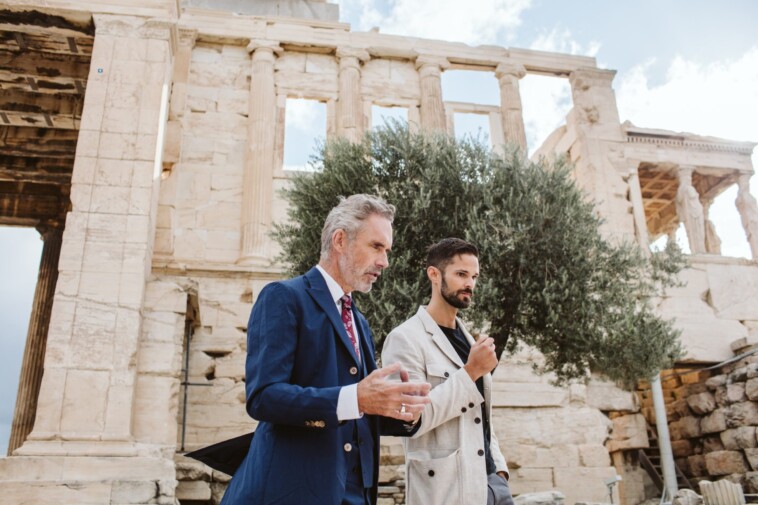The following is an edited transcript excerpt from Dr. Jordan B. Peterson’s new DailyWire+ series Foundations of The West. Join Dr. Jordan B. Peterson and his esteemed colleagues in this new 5-part series exploring the ancient cities that shaped the West.
Start time: 12:17
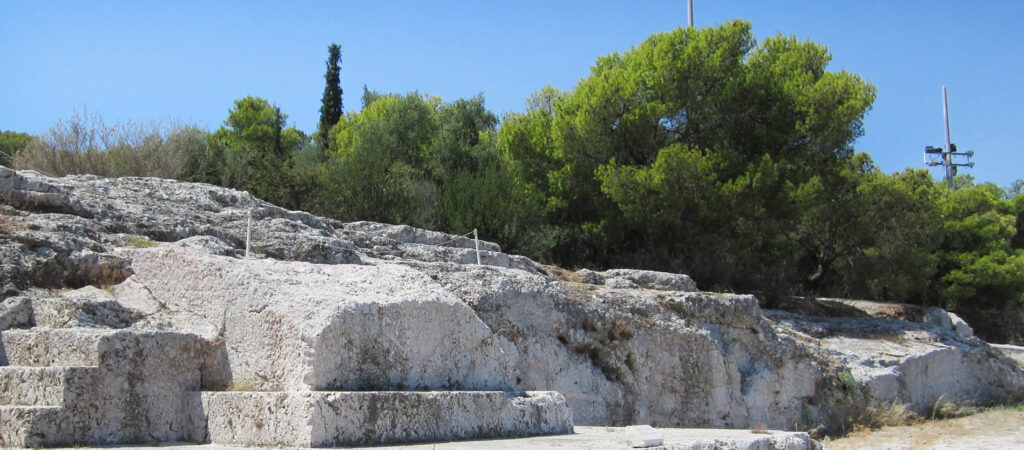
Pynx Hill, Greece. Credit: ecotourism-greece.com
Jordan B. Peterson: Where are we?
Spencer Klavan: We are on the sight of a miracle. This is what’s called the Pynx. It comes from a Greek word meaning “closely packed together.” From 507 B.C. onward, the Athenian citizens would gather here to debate and discuss the fate of their city. There was nothing, basically, that they couldn’t decide if they voted on it here in almost every context — in war, in peace. This was the site where the Ecclesia, the Democratic Council of Citizens, met to debate and vote on every question you can imagine. There was almost no choice that couldn’t be made here by the people and by a vote. Initially, we think it had about a 5,000 person capacity. Most of the original Pynx is no longer visible at this point. It is remarkable to consider. You come up here, you sacrifice to Zeus, who is, you know, Zeus of the Council, Zeus of the Gathering. And then that cry goes out: “Who wishes to speak?” And you’re gazing out upon this sparklingly new row of columns rising up effectively out of the hill as you spoke.
The closest thing to the Pynx in modern America is the town hall. In the painting called “Free Speech” by Norman Rockwell, a man gets up and just addresses the crowd. It refers to our American belief that every man is created in the image of God and endowed with liberty by his Creator. That’s the spirit of the Pynx alive in America.
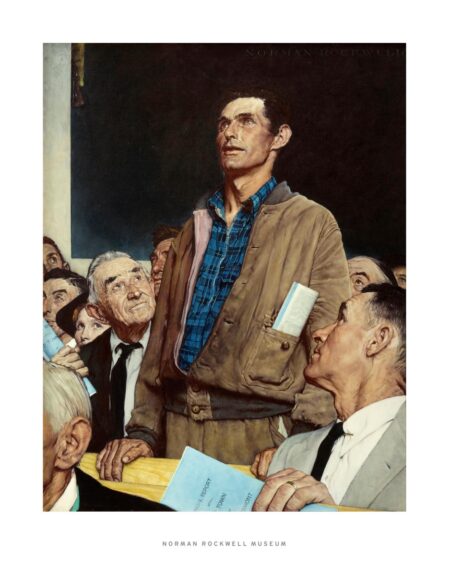
Norman Rockwell Museum Collections; SEPS: Curtis Publishing, Indianapolis
We believe fundamentally in the same idea that the Greeks had of equality before the law and freedom of speech. It doesn’t matter who you are or where you’re from. You get a say. That’s the idea. What’s astonishing about this place is the temple not far from here, the Temple of Zeus (Olympian Zeus), was built under a tyranny. Cleisthenes, who was of these very famous and wealthy aristocrats, led what became a popular uprising. And every other city around this region reacted in the same way. They had an uprising, a revolution, and the installation of a tyranny because that’s a natural response, a revolution to extreme wealth and equality. This sort of thing has happened since time immemorial. The miracle to me is that what happened instead in Athens, they turned to this guy Solon, and they gave him the sole archonship of the city. He canceled the slavery of debt, but what he didn’t do is redistribute property or take tyrannical control. So that choice had left the Athenians in this unique position among all their contemporaries. They still had this inkling, this tradition, that actually there was another course here.
WATCH: Foundations of the West, Episode 2: Athens And The Logos, with Jordan Peterson and Spencer Klavan
Peterson: How did the democratic state arise to begin with? Why did the aristocrats abandon their power or distribute it? What emerged to foster that?
Klavan: Well, it’s a great story of high morals and low venal ambition. At the end of the sixth century B.C., leading into the fifth century, we get what we would now call a democracy. Cleisthenes, in an allegiance with the Spartan King Cleomenes, marshals the people to his aid. What you end up with is an aristocrat who is so cornered that the only people he can turn to are the people. So that’s where you get this extremely direct democracy. They would meet on this hill, which they then chiseled out into this audience space, and they would ask, “Who wants to speak?” There was still a hugely powerful aristocracy. But fundamentally, what you now had was a situation in which anybody within the citizen role, from the lowest farmer to the bluest blooded aristocrat, had something to say. It’s a shocking turn of events, and it makes Athens distinctive for the rest of its history. During the Persian War, when they beat back this massive empire — whereas the Persian forces were being driven by the lash of their great king, who was the embodiment of Ahura Mazda — these guys were fighting for their freedom, and it was only because they stood up for that that we even have an idea of democracy at all. It was itself a bad word in antiquity. It was very suspicious to a lot of people.
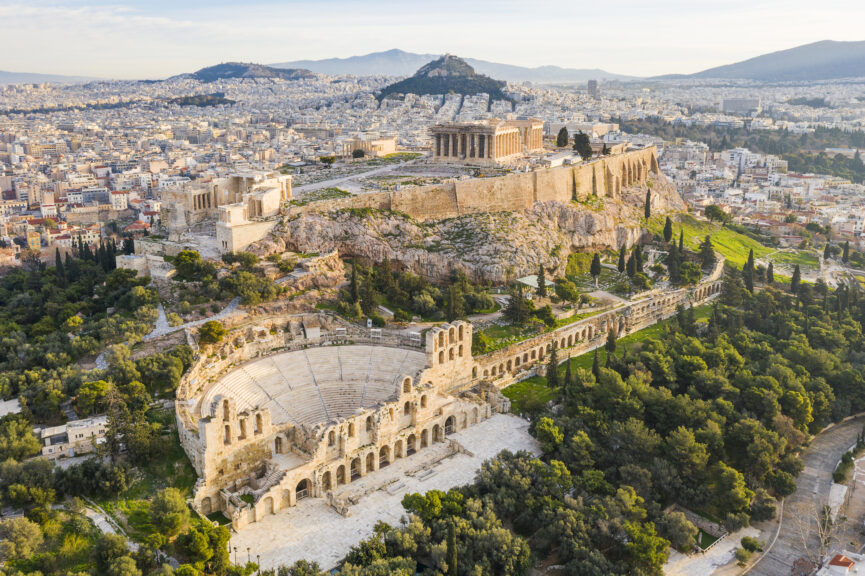
George Pachantouris. Getty Images.
Peterson: Yes, well, why would you give the rabble a voice?
Klavan: Why, indeed. Freedom inevitably creates more potential for chaos. The genius of the American founders was that they lived during a time when these questions were being reexamined and reanimated, and the founders were looking out at this enormous expanse of land and territory. And they were looking back at Athens and saying, “Well, ok, this is very beautiful that they fought for their freedom. But ultimately, of course, they ended up in a kind of disarray.” The Peloponnesian War comes, so they were looking back at the fall of that and thinking, well, it’s really Rome, the Republic of Rome, and the representative government that works best. Our whole idea of politics comes from the word polis, and a polis is a city. From that, we have our word politique, which is the art, the technique of gathering together in community and living life together. That’s not just a list of laws. There’s so much more to politique, to the art of politics and of community. And what Aristotle says is that mankind is a political animal, and by that he doesn’t mean that we’re born naturally into the world with an interest in tax policy or economic figures. What he means is that everywhere we live, we live in structured community together. The question is going to be how? What is the most just? The best way to organize our lives? That’s what politics is.
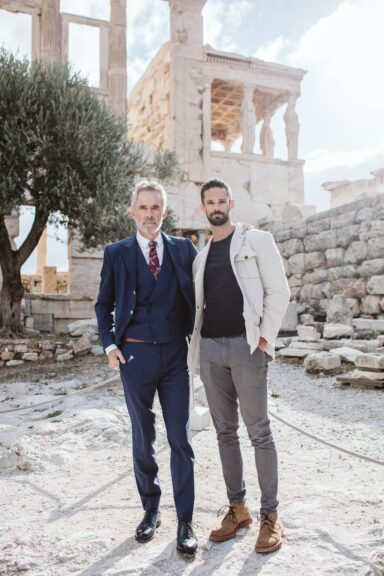
Woodman. DailyWire+.
Peterson: In the Judeo-Christian tradition, in Exodus, Jethro tells Moses that tyrant judge plus rabble isn’t a good model of government; there has to be hierarchical levels intermediating, and that’s the alternative to the tyranny and the desert. It’s something like the hierarchical organization of authority, which is, by the way, how your brain works too. It interacts with the world in nested concepts that are hierarchically structured. If that hierarchy is performing optimally, then you get the right balance between chaos and order. Then you could see in democracy that the Judeo-Christian tradition and the Athenian tradition stack. The combination of those two in some sense is the core of modern conservatism. Power should be distributed down to the hierarchy, to the lowest, most local possible level of decision. And you could say, “Well, that should just be democracy where everyone has their voice.” But the problem with that is it gets very, very fractious, and it doesn’t scale.
Klavan: The problem with democracy is that it devolves into mob rule, which opens the way for a strong man and a tyranny.
Peterson: That’s what people clamor about when they talk about the danger of populism.
Klavan: Yes, exactly.
Peterson: The mob has gotten out of hand; now, they’re going to elect a tyrant.
Klavan: Really, the republic is a perpetual motion machine. It’s designed to take that cycle and just freeze it essentially.
* * *
WATCH: Foundations of the West, Episode 2: Athens And The Logos, with Jordan Peterson and Spencer Klavan

Continue reading this exclusive article and join the conversation, plus watch free videos on DW+
Already a member?

